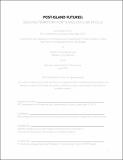Post-island futures : seeding territory for Tuvalu's fluid atolls
Author(s)
Yarina, Elizabeth
DownloadFull printable version (119.4Mb)
Alternative title
Seeding territory for Tuvalu's fluid atolls
Other Contributors
Massachusetts Institute of Technology. Department of Urban Studies and Planning.
Advisor
Miho Mazereeuw.
Terms of use
Metadata
Show full item recordAbstract
The atoll nation of Tuvalu lies only a few meters above the seas of the equatorial Pacific, and is at high risk for inundation and storm surges due to climate change. However, in spite of the media narrative of "sinking" Tuvalu, when understood in broader contexts of time and space, the existence of atolls is highly temporal and dynamic, based on sediment hydrodynamics and coral reef production. The designation of Tuvalu as a 'nation' is also a narrow temporal framing, of colonial origin. The inhabitants of Tuvalu's atolls were historically highly mobile peoples, moving from island to island in response to resource or social concerns. Tuvaluans today continue to be mobile peoples, migrating between atolls and globally, but this movement is now limited by global territorial sanctions. Climate change creates the risk of uncertain territory and uncertain identity for Tuvaluans; the submergence of the islands below mean sea level threatens rights to their territorial waters (EEZ) as well as their nationhood status as they lose the space to practice their cultural identity. The modern nation-state views its contents (population and geography) as relatively static. The inherently fluid nature of these components in Tuvalu, further amplified by climate change, problematizes the hard lines of territory and state drawn sharply in the contemporary era. When both ground and people are acknowledged as fluid entities, how might we re-imagine the spatial and social form of the Tuvaluan nation? How can Tuvalu continue to exert territorial claims when both the subject and object of nationhood are in flux? And how can Tuvalu's spatially oriented cultural identity be maintained as its population becomes increasingly mobile? Instead of ceding territory to the rising waters of climate change, this thesis posits 'seeding' territory as an alternative. The project explores the propagation of the architectural 'seed' as a way to 'grow' territory in the context of migratory populations and unstable geographies. The seeds consider territory both in the sense of transnational legislation (per the UN Law of the Seas) but also in the cultural sense of Tuvaluans, as a collective space of shared resources and identity. The seeds generate physical territory and facilitate social networks and identities. The design of these seeds is then conceptually tested in future social and environmental scenarios both for both the in- and ex- situ nation.
Description
Thesis: M. Arch., Massachusetts Institute of Technology, Department of Architecture, 2016. Thesis: M.C.P, Massachusetts Institute of Technology, Department of Urban Studies and Planning, 2016. This electronic version was submitted by the student author. The certified thesis is available in the Institute Archives and Special Collections. Cataloged from student-submitted PDF version of thesis. Includes bibliographical references (pages 303-309).
Date issued
2016Department
Massachusetts Institute of Technology. Department of Architecture; Massachusetts Institute of Technology. Department of Urban Studies and PlanningPublisher
Massachusetts Institute of Technology
Keywords
Architecture., Urban Studies and Planning.